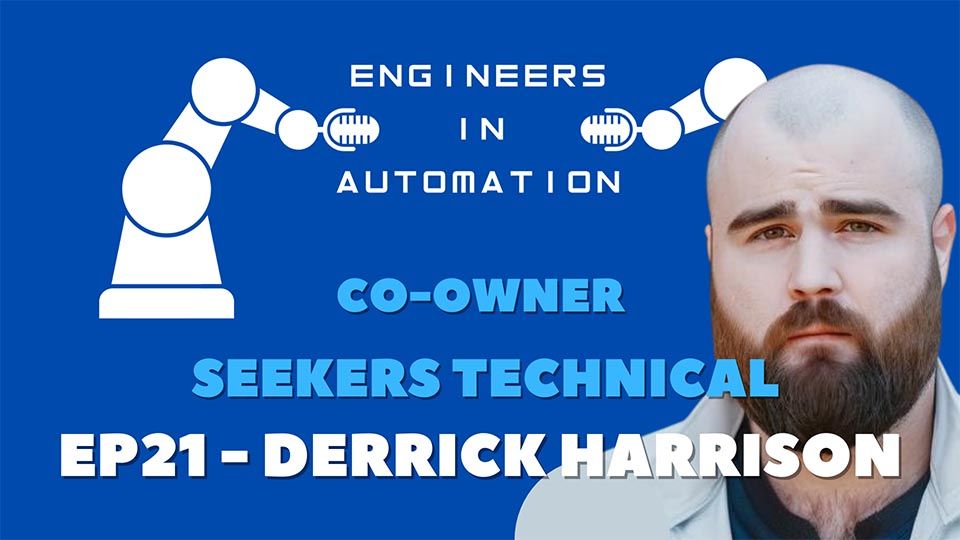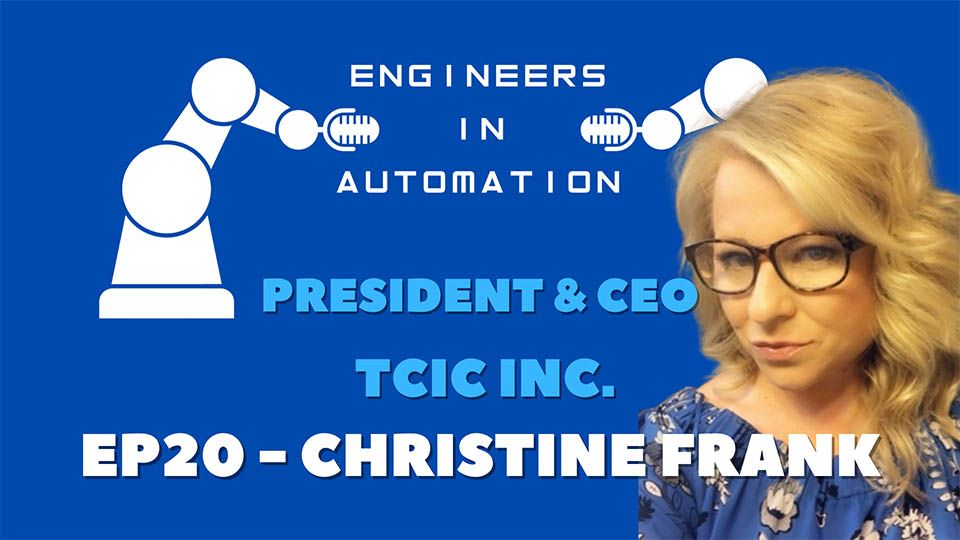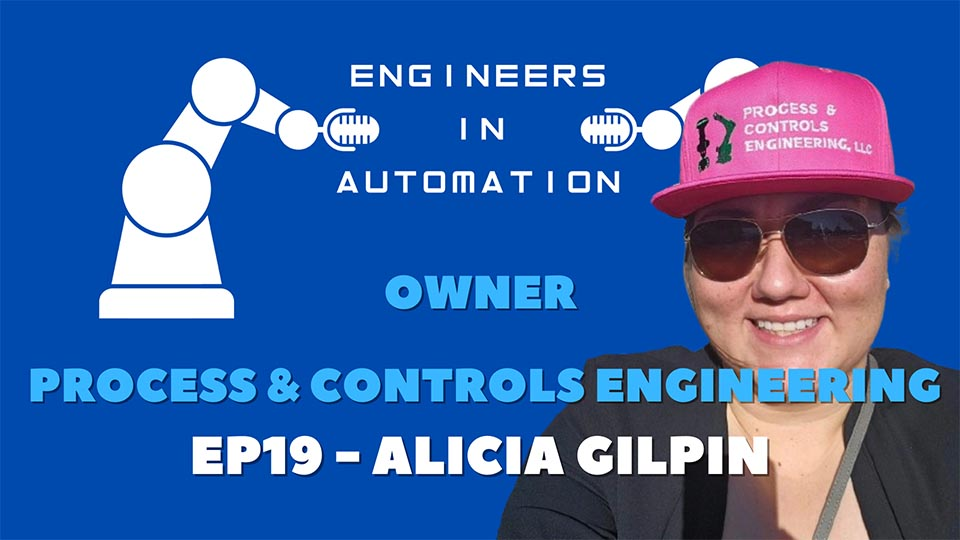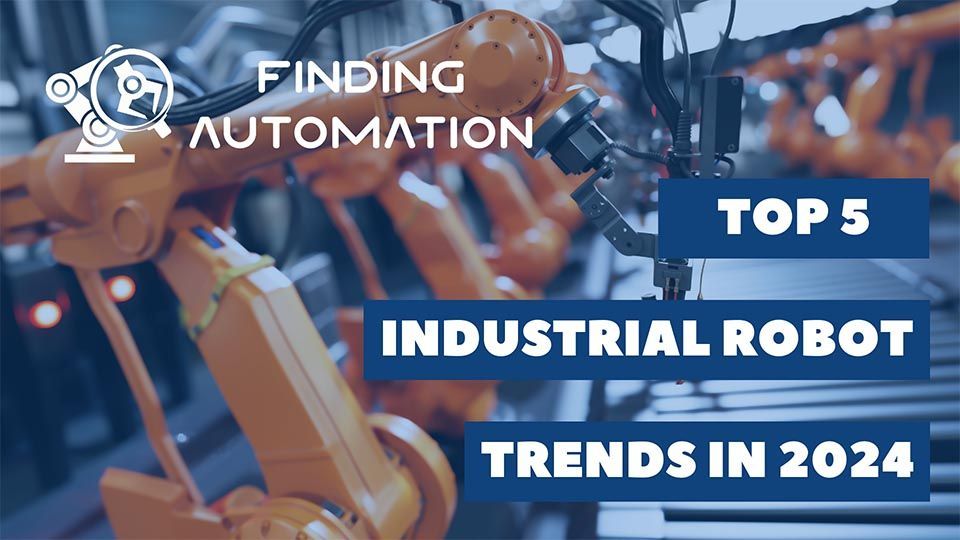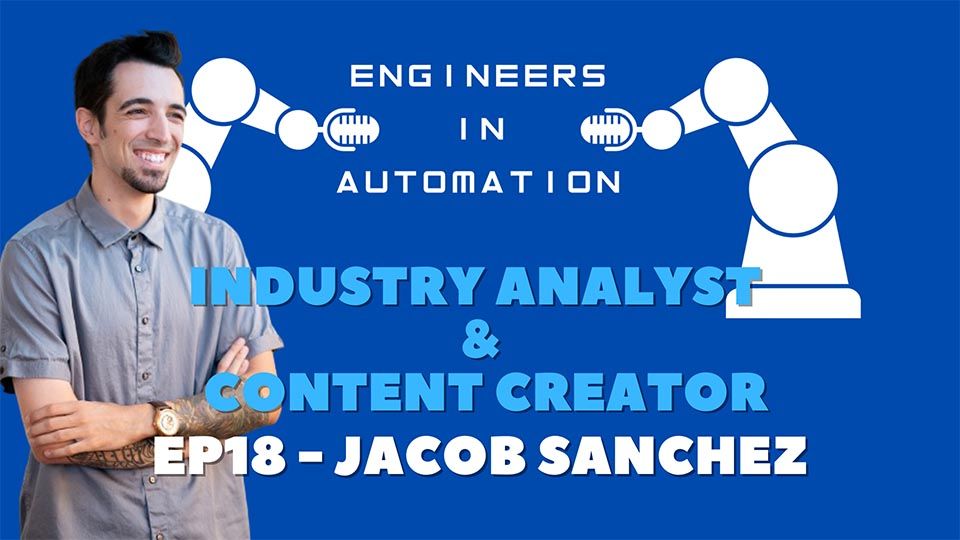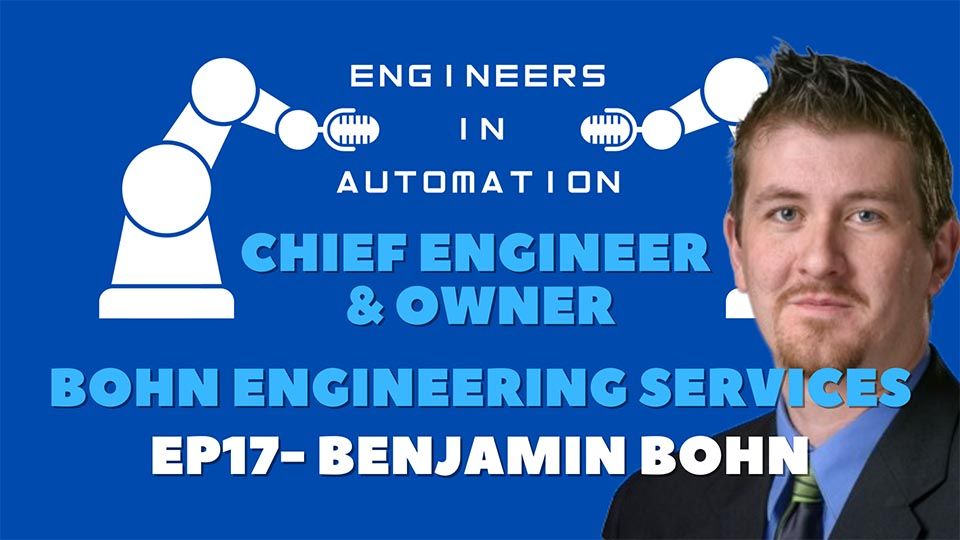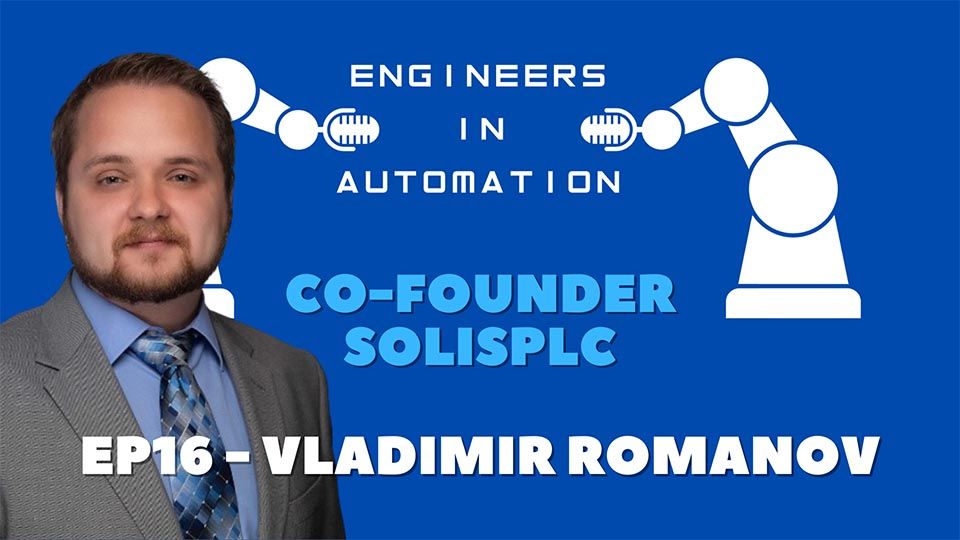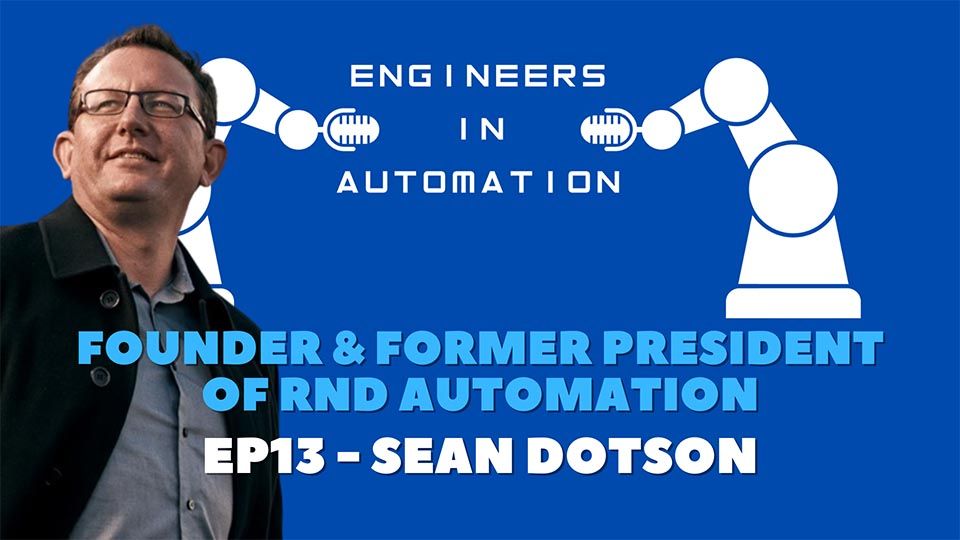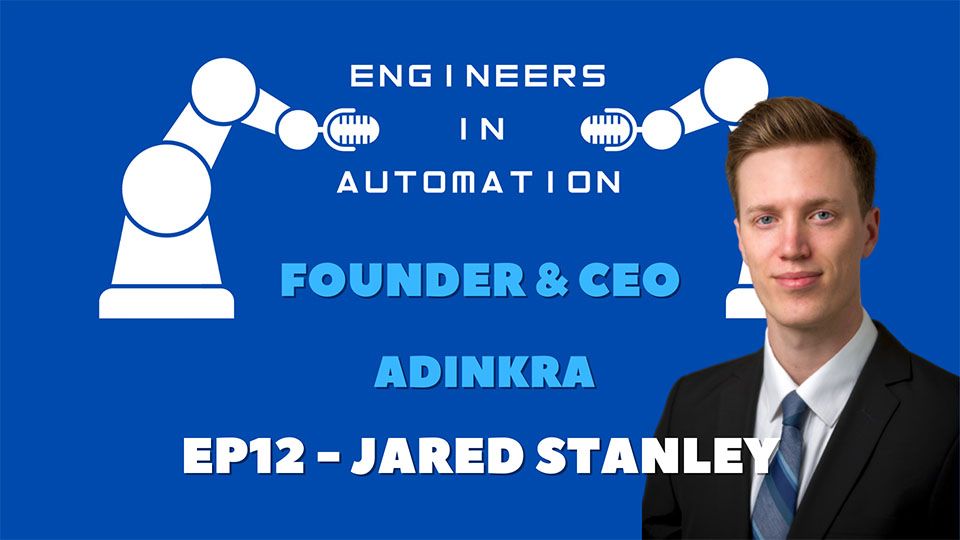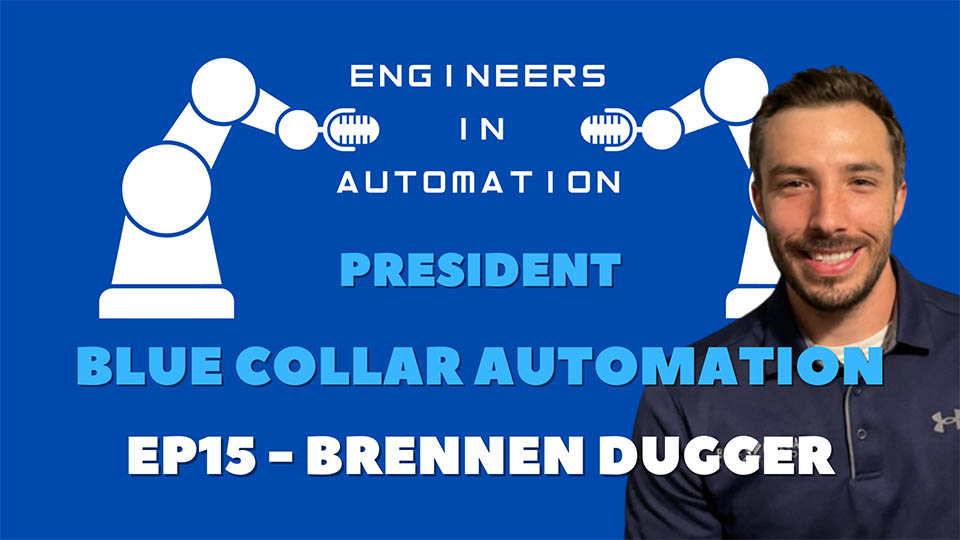Liz Miller | Learn Robotics
Engineers in Automation - Liz Miller | Episode 14
In this episode, we talk with Liz Miller, the founder and CEO of Learn Robotics. We discuss how she got into automation and robotics and how she has grown her automation coaching platform. We also discuss the coaching paths her course allows the clients to pursue to improve their automation careers and how to prepare to land their dream automation job. We also talk about the future of the robot and automation industry.
WATCH THIS ENGINEERS IN AUTOMATION EPISODE:
Keegan Dillon – Host (KD): Hi, I'm Keegan, and this is Engineers in Automation. On today's episode, we're going be talking with Liz Miller. She's the founder and CEO of Learn Robotics . We're going to talk a little bit about how she started her company. We're going to talk about growing the business. We're also going to talk about what kind of coaching she does with each of the engineers that are on her platform. Now, let's go talk automation!
KD: All right, and welcome to today's episode, I'm here with Liz Miller. She is the founder and CEO of Learn Robotics. Liz, welcome to the show.
Liz Miller – Guest (LM): Thanks so much for having me, Keegan.
Liz Miller's Background In Automation:
KD: Yeah great, thanks for being here. And let's just go ahead and jump into it. Can you give us a little bit of background about yourself?
LM: Yeah, so I'm a robotics engineer by education. I got into robotics by accident, I always thought I was going to become a lawyer, went to engineering school. And now I run the company Learn Robotics, where we help people upgrade for the future.
KD: Oh, wow. And can you explain a little bit about Learn Robotics? And what that is?
LM: Yeah. So we have kind of two main areas that we help people with, we help the absolute beginner, get their start in robotics through our online full stack, Junior roboticist certification. But I think for the people listening, you're going to be more interested in our career advancement in robotics are taking your engineering skills, and actually applying them into the robotics industry through our robotics career blueprint program.
Starting Learn Robotics:
KD: Oh, wow. That's, it sounds interesting. It sounds very cool. Again, before we dive too much into that, can I just ask, what made you start this company? What did you see the need for what was that catalyst that you decided, “Hey, I want to start a company” and learn robotics. And this is, you know, what, what made you do that?
LM: So, I think I was at a point in my engineering career, I was working at Raytheon, as an automation engineer working with senior leadership going through the process of trying to get as many robotics related skills as possible and an applied way. And there just wasn't a good way to do that. With without, you know, sitting through industrial trainings, going and taking weeks, you know, spending 10s of 1000s of dollars to get certifications, and then going through that process, but then not actually being able to do anything other than having a certificate, you know, it's like you go through it, but they don't really cover your exact issue, or the skill that you're, you're actually missing.
And so I went out and I created Learn Robotics, I wanted to be able to help people find what the actual problem was filled that skill gap. So then they could go and focus their energy in a more structured way, and then advance their career.
The difference between coaching and recruiting?
KD: Okay. Okay, I understand a little bit. And then let me ask, let me ask this. What would you say are the differences between what you're doing and say, like a recruiter that wants to try to help people find a new job? What's the big difference there? Because you're more of a like a coach, right?
LM: Yeah, so we do more like career consulting. So we're going to take the engineering professional that has, you know, that mid-level experience, and we're going to help them loosely monetize their skill set and a better way. So if you could put the energy into your engineering career and get a bigger return financially out of it, we're going to take a look at your background, we're going to look at all the things that you've done over the course of your education, your training, your professional life, and then all the things that you want to do, including your lifestyle, including your financial goals, and we're going to try to help you find a role in robotics that makes the most sense for you. And we build you a blueprint.
So that blueprint is what you're going to be using in our 12-week program to actually implement the plan that's going to get you from your current regular engineering career into a, you know, 100 to $200,000 career working in the robotics industry. So we're less about the company, and we're more about helping you find the right fit and exploring different opportunities in robotics, because even though robotics sounds very niche, it's not like you can go so many different directions within the industry. And we're really trying to figure out like, what is the best combination of your skills to get you the most return?
Industrial Automation Coaching and Robotics Coaching:
KD: Yeah. And you touched on it there briefly said, because I was gonna ask, okay, how long does this coaching lasts? You mentioned? What was it 90 days or so 90 days? So then let me let me ask my next question that I wanted to ask, is it more like robotic side? Are you guys doing also some automation and control side as well? Or do you focus more on the robot portion?
LM: Yep. So we have kind of two, two core pathways that clients will go down and it's all based on their background and their interests, what makes the most sense. In 90 days, you're not going to become an expert of everything, you're going to become what we call a micro expert in robotics, and that's going to be based in one of the pathways. The first path is like your classic academic, you know, robotic software engineering, AI, algorithms, machine learning, you know, like the what you would see in research.
And then the other path is what you're referring to is industrial automation and controls, where you're working in maybe more manufacturing, you're working on PLCs, you're working on industrial robots, you're, you're using robots to complete a process. And then we'll work with you to fill in any skill gaps in either of those areas.
Automation Career Path:
KD: Okay, and then how does, I guess, would these students then determine which career path that they want? Do you guys help guide them towards one or the other? Or, generally, is that they kind of say, “Oh, hey, I'm more interested in the manufacturing side of it or not.” I want to be more on, you know, building robots. You know, how does that work?
LM: So the very first thing that we do with clients when they enter in the program is we build our blueprint. So we have an action plan session where we go through and this is where it's really important to take the time to figure out what current state is, you know, like in the working world, we do this all the time, right? We look to see, like, what is currently happening as engineers, and then like, what is the process we need to do to get to future state? And so we do that with the individual. So we're looking at we're establishing what that current state is, what are all the skills that you're bringing to the table? What are all the experiences that you're, you're bringing to the table?
And then what we do is we look at future state. What are all the things you want to be doing? What are all the lifestyle goals, financial goals, you know, anything that could impact your career long term? And then we're just playing matchmaker on what makes the most sense, like, have you considered you know, this particular role within industrial automation? Have you considered, you know, this other type of role working more in a manufacturing environment? We're really looking at the, you know, custom tailored solution for the person that's that we're working with?
Student Enrollment Size:
KD: Wow, that's, it's really cool. It's definitely unique. I haven't heard of anything else really, that's like this. So it's really, really cool. Can I ask how many students right now or clients, I guess, would you say you have?
LM: Yep, so we enroll about 30 a month. So we're not trying to serve millions of people at a time because, as you can tell, like, we're really trying to get all of the information, we need to help clients make good decisions for their long-term financial success, their career success, a lot of what we're doing is bringing, like the money math that isn't taught in engineering school, to the client, so that they can then start to financially plan long term, what their next three careers in the industry could look like. And then they just let time do its thing. So if they execute the plan over, you know, a 25, 30 year career, then by the time they retire, they're set up, you know, for long term, you know, success. They don't have to really worry about money. Because they were they have a strategy, right? They have a plan that was built to them. And it's built around what they want.
Learn Robotics Company Size:
KD: Yeah, cool. And then how big is your organization? How many people work for you? I mean, if you're bringing in 30 people a month, that's quite a lot. I mean, if you're asking me, hard to manage everybody. How many people would you say you staff right now?
LM: Yep, so it's really funny. Um, the company is primarily built on automation. So, we have a lot of automation that runs the back-end systems. So a lot of the, you can loosely call it like RPA, robotic process automation. So we have a lot of like classic roles that are actually done by robots. And I run a very lean team. So we have front-of-the-house career advisors that help people go through that process of even deciding if the robotics group blueprint is a good fit.
And then, I lead the team of subject matter experts. So we have a few people on the industrial automation side, they specialize in controls manufacturing, robot programming, and then we have a few people that are more academic, you know, the Masters, PhDs, focusing more on computer vision. So we run a very lean operation, but we wouldn't be able to do it without automation.
The Learn Robotics Community:
KD: Cool, cool. And then now I guess I want to ask with that, how, how are people able to like, you know, connect with these coaches and yourself is that can they do that daily? Is that a weekly meeting? How often are you connecting with an individual then if there is a little bit of automation there, obviously, but how much are you guys able to reach out and communicate with them?
LM: Once they're fully onboarded into the program, they get access to our private client community, so that's 24/7. I don't work 24/7 but I am very responsive. I know we have a lot of engineers that like to work you know, in the early hours of the morning but I'm usually on during the day, so I mean, technically they could get as much or as little feedback as they want, that's really what we're here for.
We're not like me and my team, we're not here to provide lectures, we're here to give you feedback, because feedback is usually what's missing. Like you don't know what you don't know. And so if you do something, and you have a question, that's really where we address those in our community. The goal is, is to be very action focused. And so it's like, try it, see what happens, you get some feedback and keep iterating.
KD: Cool. So I guess with that community, I just wanna make sure I understand, are you able to reach out and like, ask a question to everybody who's involved? And then they can respond too?
LM: Um-hm
KD: Oh, wow, okay. That's cool.
LM: Yeah, yeah. It's like, yeah, it's pretty cool. There, there are channels where you can converse about robotics taught, like anything that's related to robots, like the technical side, then we have career side. We have, you know, people sharing their wins, like any interviews, offer negotiations, accepted a new job. And then we have all of our training modules in there as well.
Learn Robotics Members:
KD: Cool. And then, where are you finding all of these clients?
LM: So we actually started Learning Robotics started out as a blog years ago, and so we get a lot of traffic to that blog. And so a lot of our readers, they read, they've been following me for years, they've been reading my content, they actually go through and they apply. So it, they've kind of built this like, virtual relationship with me. And they, they want to have somebody that's going to actually work with them directly, and give them that critical path to the next step in their career.
KD: Cool. And then, you know, with that are, are they able, are you guys able to kind of track to see how their progress is going? Like if somebody comes in and say, “Hey, I'm currently making $50,000 a year? You know, I went through the program. Now I'm making 20% more after.” Do you guys kind of track any of that information?
LM: Yup, that’s a really good question. Yep. We do.
Increased Salaries After Coaching:
KD: Okay, good. And, you know, I'm sure you're seeing some good returns, then on people that take the course, is there a percentage average kind of that you see is increased from a lot of these people? Can I ask that?
LM: Yeah, so typically, and I should be careful with how I statistically say this. Some of our clients, when they go through the program, they make their money back from joining the program, right when they sign into robotics. So there's an instant return on even being in the program. But over the course of a year, it's generally a three to 4x a year investment with us.
Yeah, and it's usually, see it's interesting because they're starting salaries can vary, we generally look for the mid-level engineer as like the low end. So, somebody that has, you know, three to five years of experience there, they're working professional in engineering or technology. So they're coming in, you know, I would say on the low end, like 70’s, $70,000 a year, and it could always be higher, and it's always case by case, right, we're usually our goal is to get them to 100,000. If they're below 100,000. And if they're above 100,000, our goal is to try to get them on target for 200,000.
KD: Oh wow! Where do I sign up?
LM: Yeah, pretty much. So it's, it's all based on what they're coming in with what they're interested in. And then also putting in kind of a mini financial plan that's going to get them to where they want to be long term. So on a on a five year basis, you'd be looking at, you know, possibly a 10x return on your money with us. So it's like, why wouldn't you do it if you want to work in engineering, and you actually want to get into robotics?
Coaching New Graduates:
KD: Yeah, that's, that's neat. That's some cool, cool information it know, and you kind of touched on already a little bit, your who your ideal client would be, you know, somebody with a little bit of experience. Have you found any younger students potentially that aren't finding work right now that “Hey, I gotta get my foot in the door.” And, you know, do you have any examples of students or clients doing that? Where they were struggling to get in somewhere, they worked out with you guys. And then they get landed the job that they wanted, their dream job, you know, starting job.
LM: We've had a few recent college grads, I can think of a couple off the top of my head electrical engineer. Went through that went through his Bachelor's was having a really hard time getting employed, settled for like a minimum wage IT job came in work with us, and I think he was one of our faster clients to go through the process. I think was when within like six to eight weeks he was working on I believe he's still working at Amazon as a robotics deployment engineer. So he went from that minimum wage IT job with an electrical engineering degree to you know, like, probably in the 90s plus working at Amazon entry level.
KD: That’s a great story.
LM: Yep. So that's so that's one type of student, we also get a lot of students that are maybe more academic. So the masters level students that want to actually go from, from academia into industry, so we'll help them as well.
Learn Robotics Job Placement:
KD: Yeah, and I would think that's kind of a hard transition for some, you know, a lot of professors maybe have been out of the industry for too long. So then getting back in, you know, maybe difficult, so I'm sure that's a different type of learning curve compared to somebody who's either already in the industry, you know, trying to build their current and then it's almost like two separate jobs there, right? You have, because academia feels like a different animal, you know, it's just some of the stuff is there, the way they're learning the way they're teaching, and then you get out in the real world. And it's like, Well, I wasn't taught this, or we don't do it this way. This isn't right. But hey, you got to make it work. So I'm sure that's a new challenge for you guys, as well. I do want to ask, you know, do you guys help. It sounds like you're placing a lot of people. Do you do any work? You know, kind of helping these people land these gigs? How does how does that work? Sounds like it's part of the process is that there's a list of available jobs, I guess you'd say almost like a job board type thing, can you talk about that at all?
LM: Yeah, it's not that at all, we're actively expanding that part of the business right now. Or we have roles that clients can get, that can apply to, that can get in to. What we try to do, though, in the beginning of the program is really get clear on what they want. Because in automation, like you could have two robotics engineer job titles, at totally two different companies. And they're totally different. And so we try to get really, really clear on what it is that the client is. Like, how would they describe themselves? And we, once we have that we teach them how to fish. So it's like, you need to understand how to find opportunities that relate to what you say you want to do. Because if you don't know what you're what you want to do, it's going to be really difficult in that interview, to explain to the hiring manager, why you're even there.
So we go through this process of teaching them and teaching them how to fish, how to find the right opportunities within robotics, and actually get that first interview. And then we also supplement that with open opportunities that way, it's kind of like the full stack career search that way, like you're not married to me and my team, but you also have some opportunities there. You're in complete control of this process moving forward.
Learn Robotics Interview Preparation:
KD: Yeah. And then, with that, it just kind of popped into my head here. Do you guys also do some coaching some one-on-one with the interview process? I know, have been a big fan and tell people all the time, even if you're not looking for a new job to go out and interview one or two places every couple years just to stay up to date with the processes? What are the questions that are coming out? I've just found that, you know, and I myself have done it for many years, just, you know, even if I wasn't necessarily looking, but just try to get that rhythm. Do you guys help out with that a lot with this with the coaching?
LM: Yeah, so actually, one of our recent clients, he's actually off-boarding because he's all set. He's landed his dream role in robotics. Right before his second interview, we did a mock interview. And then he went on-site for that second interview, and then he got you got the job. So, like it, it does. And he even said, like, it really does help, like walking through. It's like a dress rehearsal. You know, if you can practice through what you're going to say and how you're going to say it, you've already done it. So then you show up, you feel more confident. And then when you feel more confident, like the hiring manager knows that you're a better fit for the role. So then you get the offer, and then negotiate the offer and start working.
The Future Of Robotics:
KD: Cool. So let me ask with Learn Robotics, what's the future look like to you? Where are we going next?
LM: Robotics is not even close to where I think it will be in the next probably 10 to 15 years. So I think if you're an engineer listening to this, and you have any inkling to get into the industry, now is the time because the wave hasn't quite hit yet. I think it will be hitting and probably the next five, six years. And the people that decided today that they want to get into the industry are going to be the ones leading the industry, because they're going to be five years ahead. So I think that that's kind of where I see things going. I think that there's this big convergence between engineering disciplines that are merging into what I call robotics. So software, hardware, systems, so everything is all kind of pointing to one point. And so I think that it's a really unique time to be alive and in this space because there's just so much innovation happening. So now it'd be the time to get involved, if it's something you've been on That's about doing.
Learn Robotics Mentorship Program:
KD: Yeah, that's great advice. I couldn't have said it better myself it was it was perfect. And then as your organization grows, as you continue to expand this, is there anything you know, that you want to do with this company? Is there certain goals that you have that you want to reach? You know, if you can talk about that?
LM: Yeah, I mean, I think it comes down to really just getting as many people into the robotics industry through direct mentorship through direct guidance. I think that anytime you learn from an expert, it significantly shortens the learning curve. I'd mentioned at the beginning that I got my start in robotics by accident. And I only got into robotics because I had a mentor. And it was an accidental mentor. I didn't even know that that was even a thing. So if you're listening to this, and you didn't know that you could actually, basically buy the skill you want or buy your future, what you want for a fraction of the price and time and money by just working with an expert. You can make significant progress, and you'll have so much more clarity on what you should even be doing.
Learn More About Learn Robotics:
KD: Yep. Yep. Great, great advice. And before we wrap up today, where can people find you? Where can they connect with you? How can they get in touch with you?
LM: Yeah, the best place to go will be LearnRobotics.org. You'll find all of the programs there. If you want to check it out. I've got a 12-minute training that walks through the process on how to actually get into the robotics career blueprint explains our process that we use, who we work with in more detail. And if it makes sense, you can submit an application to potentially work with us. You can check that out on at https://www.learnrobotics.org/engineersinautomation/.
KD: Awesome. Awesome. Well, thanks, Liz. We'll put a link down below with all that information for everybody to go ahead and check that out. So if you guys liked today's episode, please give us a like, comment, share, and don't forget to subscribe and we hope that you join us here next time on Engineers in Automation. Thanks.
LM: Thanks Keegan.
If you enjoyed that podcast episode, get more information below!
CONTACT OUR GUEST:
The best place to find Liz or get started in a Learn Robotics program.
How to Maximize Your Engineering Career by upgrading to a $100k-$200k Career in Robotics (12-min training).
SPECIAL THANKS TO OUR SPONSOR:
JOINER Services sponsored this episode. A platform where self-employed engineering contractors can showcase their own talents, and businesses have an opportunity to hire their services. If you want to learn more about JOINER Services and its engineering service platform for contract engineers, follow them on social media or sign up on their website.
